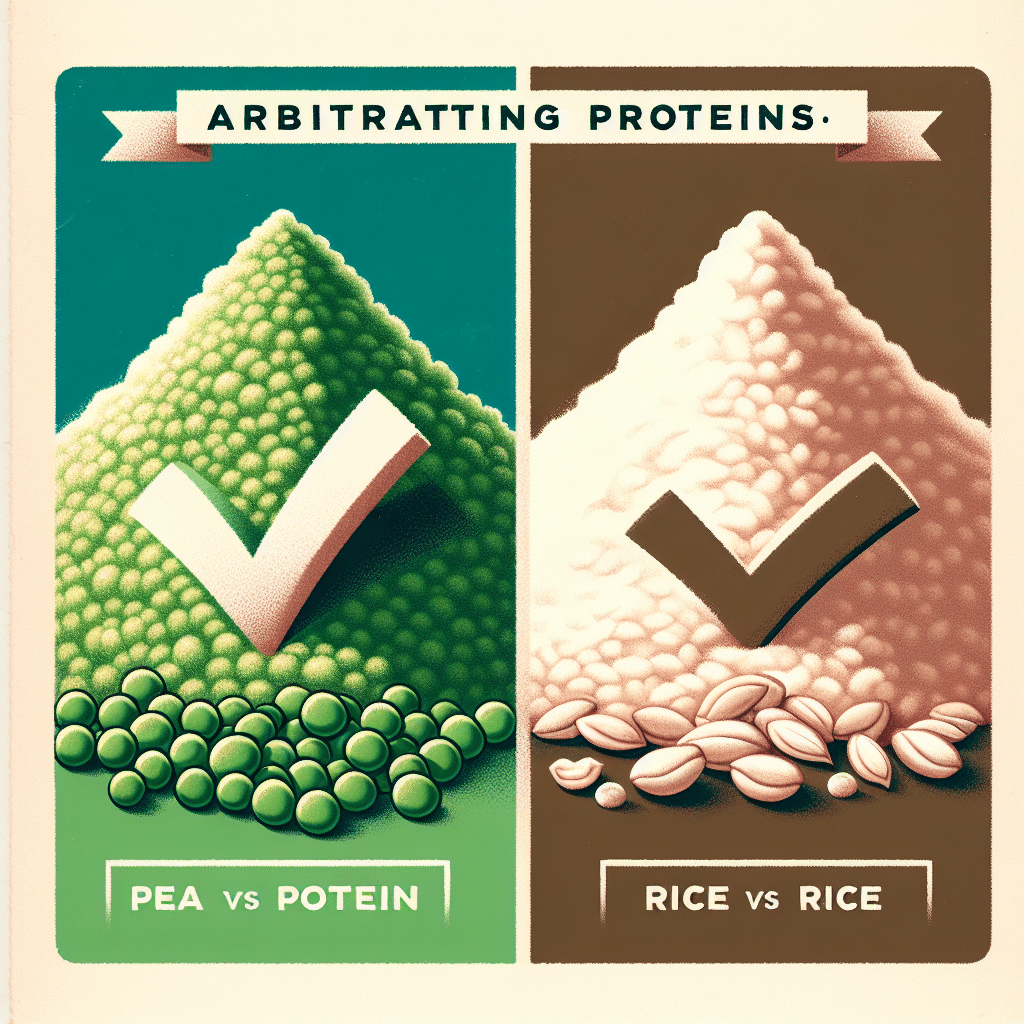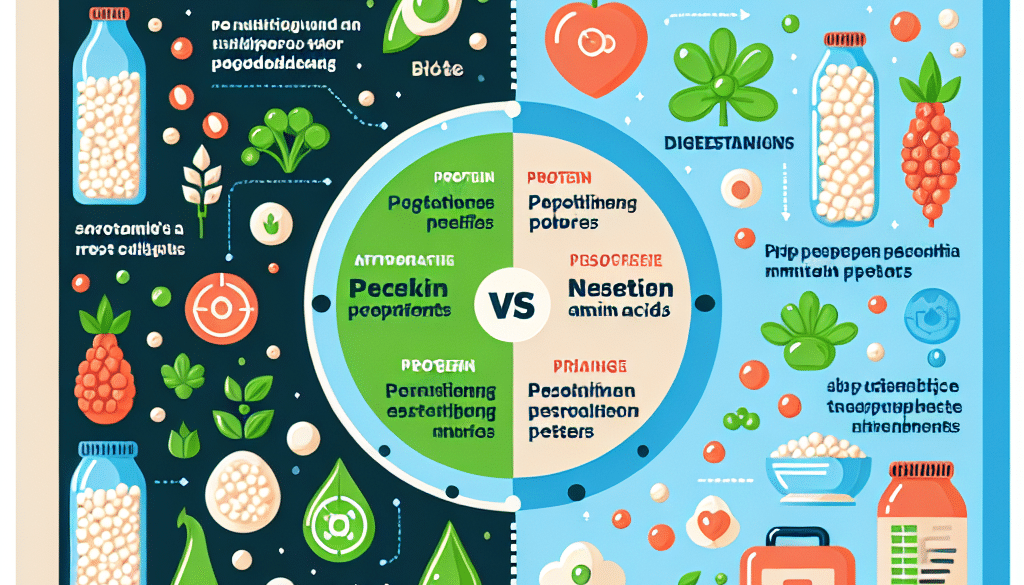Is pea protein better than rice protein?
-
Table of Contents
- Pea Protein vs. Rice Protein: Which is the Superior Plant-Based Protein?
- Understanding Plant-Based Proteins
- Nutritional Profile of Pea Protein
- Nutritional Profile of Rice Protein
- Comparing Pea Protein and Rice Protein
- Amino Acid Profile
- Digestibility
- Nutrient Content
- Health Benefits
- Environmental Impact and Sustainability
- Which Protein Should You Choose?
- Conclusion: Balancing Benefits for Optimal Nutrition
- Discover ETprotein’s High-Quality Protein Products
Pea Protein vs. Rice Protein: Which is the Superior Plant-Based Protein?

As the demand for plant-based proteins continues to rise, consumers and manufacturers alike are seeking the best sources to meet nutritional needs and support a healthy lifestyle. Among the various options available, pea protein and rice protein have emerged as popular choices. But which one is better? This article delves into the nutritional profiles, benefits, and potential drawbacks of both pea and rice proteins to determine which might be the superior plant-based protein source.
Understanding Plant-Based Proteins
Before comparing pea and rice proteins, it’s essential to understand what makes a good plant-based protein. Proteins are made up of amino acids, which are the building blocks of muscle and tissue in the body. There are nine essential amino acids that the body cannot produce on its own and must obtain from food. A complete protein source contains all nine essential amino acids in sufficient quantities.
Nutritional Profile of Pea Protein
Pea protein is derived from yellow split peas and is known for its high protein content and rich amino acid profile. It is particularly high in branched-chain amino acids (BCAAs) like leucine, isoleucine, and valine, which are crucial for muscle building and repair. Pea protein is also hypoallergenic, making it a suitable option for those with allergies to dairy or soy.
- High in BCAAs
- Hypoallergenic
- Rich in iron
Nutritional Profile of Rice Protein
Rice protein is typically made from brown rice and is another excellent plant-based protein source. It is easily digestible and contains a good balance of amino acids, although it is lower in lysine compared to pea protein. Rice protein is also hypoallergenic and is often considered one of the gentlest proteins on the digestive system.
- Easily digestible
- Hypoallergenic
- Gentle on the digestive system
Comparing Pea Protein and Rice Protein
When it comes to comparing pea protein and rice protein, several factors need to be considered, including amino acid profile, digestibility, nutrient content, and potential health benefits.
Amino Acid Profile
Pea protein is closer to being a complete protein than rice protein. It contains higher levels of lysine, an essential amino acid often lacking in plant-based proteins. However, rice protein is not far behind and can be complemented with other protein sources to achieve a balanced amino acid profile.
Digestibility
Both pea and rice proteins are known for their digestibility, but rice protein is often considered easier to digest due to its lower fiber content. This can be particularly beneficial for individuals with sensitive stomachs or digestive issues.
Nutrient Content
Pea protein tends to be higher in iron and arginine, an amino acid beneficial for heart health and blood flow. Rice protein, on the other hand, is usually lower in calories and fat, making it a leaner protein option.
Health Benefits
Both proteins offer unique health benefits. Pea protein has been shown to aid in muscle growth, weight management, and may help lower blood pressure. Rice protein also supports muscle recovery, is heart-healthy, and can assist in weight loss efforts.
Environmental Impact and Sustainability
Another aspect to consider is the environmental impact of producing these proteins. Generally, plant-based proteins have a lower environmental footprint compared to animal-based proteins. Pea protein production requires less water and land than rice protein production, making it a more sustainable choice.
Which Protein Should You Choose?
The decision between pea protein and rice protein ultimately depends on individual dietary needs, preferences, and potential allergies. For those looking for a higher iron intake and a more complete amino acid profile, pea protein may be the better choice. For individuals who prioritize digestibility and a lower-calorie option, rice protein could be more suitable.
Conclusion: Balancing Benefits for Optimal Nutrition
In conclusion, both pea protein and rice protein offer significant health benefits and can be excellent choices for those seeking plant-based protein sources. The “better” protein is subjective and varies based on personal health goals and dietary requirements. For optimal nutrition, it may be beneficial to include a variety of protein sources in your diet to ensure a comprehensive intake of all essential amino acids.
Discover ETprotein’s High-Quality Protein Products
If you’re looking to incorporate high-quality plant-based proteins into your diet, ETprotein offers a range of products that cater to your needs. Their selection includes organic rice protein and pea protein, both characterized by a neutral taste and non-GMO, allergen-free attributes. With purity levels over 98%, ETprotein’s offerings are ideal for various industries, including nutraceuticals, sports nutrition, and more.
About ETprotein:
ETprotein, a reputable protein and L-(+)-Ergothioneine (EGT) Chinese factory manufacturer and supplier, is renowned for producing, stocking, exporting, and delivering the highest quality organic bulk vegan proteins and L-(+)-Ergothioneine. They include Organic rice protein, clear rice protein, pea protein, clear pea protein, watermelon seed protein, pumpkin seed protein, sunflower seed protein, mung bean protein, peanut protein, and L-(+)-Ergothioneine EGT Pharmaceutical grade, L-(+)-Ergothioneine EGT food grade, L-(+)-Ergothioneine EGT cosmetic grade, L-(+)-Ergothioneine EGT reference grade and L-(+)-Ergothioneine EGT standard. Their offerings, characterized by a neutral taste, non-GMO, allergen-free attributes, with L-(+)-Ergothioneine purity over 98%, 99%, cater to a diverse range of industries. They serve nutraceutical, pharmaceutical, cosmeceutical, veterinary, as well as food and beverage finished product distributors, traders, and manufacturers across Europe, USA, Canada, Australia, Thailand, Japan, Korea, Brazil, and Chile, among others.
ETprotein specialization includes exporting and delivering tailor-made protein powder and finished nutritional supplements. Their extensive product range covers sectors like Food and Beverage, Sports Nutrition, Weight Management, Dietary Supplements, Health and Wellness Products, and Infant Formula, ensuring comprehensive solutions to meet all your protein needs.
As a trusted company by leading global food and beverage brands and Fortune 500 companies, ETprotein reinforces China’s reputation in the global arena. For more information or to sample their products, please contact them and email sales(at)ETprotein.com today.












